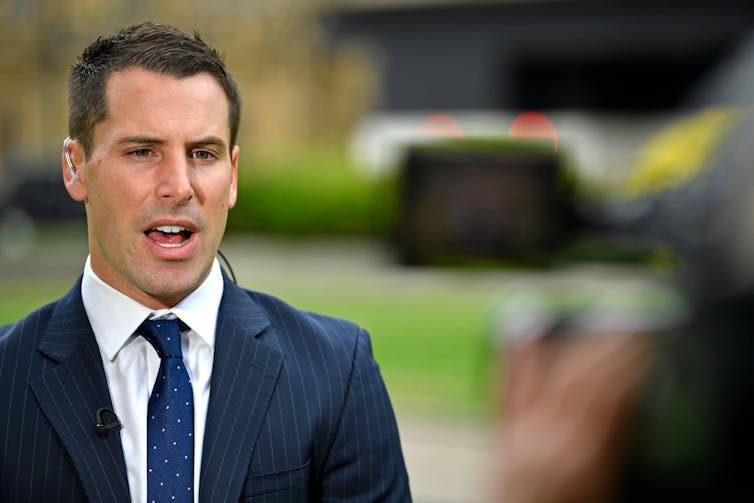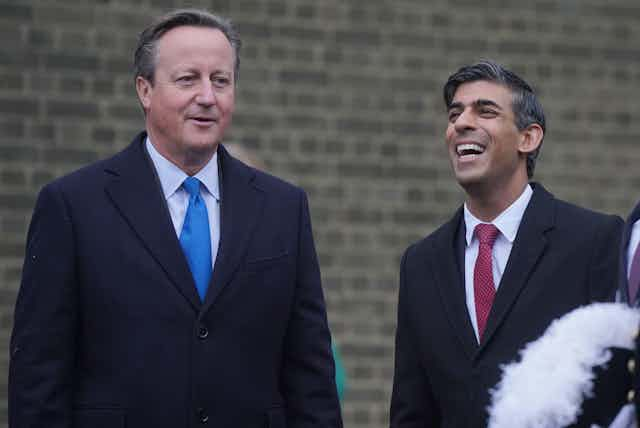Conservative MP Scott Benton has become the latest British politician to face suspension for breaking lobbying rules in what is becoming a regular cycle of scandals. Parliament’s committee on standards has recommended a 35-day suspension for Benton after he was alleged to have lobbied for the gambling industry and given company access to confidential government documents.
Benton is accused of leaking the government’s gambling white paper ahead of publication, thereby handing over information about plans to bring in tighter regulations for the industry. Benton has said the parliamentary committee’s report into his behaviour contains “factually inaccurate” statements. He has said he will appeal his proposed suspension and will make a formal complaint, accusing the committee of leaking the report to a journalist.
Meanwhile, newly appointed foreign secretary and former prime minister David Cameron carried out an array of activities during his stint out of office that are potentially now contentious.
The UK lobbying industry is the third largest in the world, with more than 4,000 lobbyists in and around Westminster and Whitehall. But it has some of the weakest regulation. Major scandals have regularly punctuated British politics since the 1990s and lobbying has turned into a continual, rolling controversy.
Despite the many democratic benefits it brings, the word “lobbying” has come to represent, as political scientist Wyn Grant put it, the “dark side of politics” in Britain.
Attempts at reform
In our latest research, we document calls for more stringent rules in the past two decades, both from within and outside parliament. And while there have been gradual moves towards tighter regulation and more openness about lobbying activity, many complain these haven’t gone far enough.
The problem is that the principle of self-regulation – the idea that politicians can “look after themselves” – has continually won out. Promises of radical change are almost always watered down and diluted.

Cameron symbolises the problem that politicians who try to change the system are also the ones who stand to benefit from not changing it at all. He came into power in 2010 promising to clean up the “too cosy” and “secret” links between money and politics, and then passed a series of reforms that were criticised for being insufficient.
These reforms provided a rather weak register of consultant lobbyists, which only captures, by some estimates, around 1% of those involved. This sits alongside a gradually strengthening register of financial interests, which has existed since the 1970s.
Once out of office, Cameron then turned lobbyist, chasing ministers on behalf of supply chain finance company Greensill amid the most intense period of the pandemic emergency. The Treasury select committee argued that Cameron’s texts to ministers for Greensill displayed a “significant lack of judgement”. The committee found he did not break lobbying rules, but that this reflected on the “insufficient strength of the rules”.
Cameron then spent several years working the speaking circuit in China before returning to be foreign secretary.
A new approach
In the wake of the lobbying perma-crisis that was Boris Johnson’s government, lobbying rules for MPs have been tightened. In the summer of 2023, after much delay, the government promised a new “single platform” for data, new monthly publications and more detail on “hidden” or “anonymous” lobbying. While these were welcomed, many concerns remained, as with past reforms, over the scope and strength of the changes.
Ideally, lobbying regulation works in two ways: through anticipation, by making politicians feel watched, thereby deterring poor behaviour, or by accountability, by catching them out if they do cross a line. A good lobbying system should be part of an ever-expanding ecosystem, working alongside other tools to “clean up politics”, such as freedom of information laws, open data initiatives or whistleblowing regulations.
Despite continual pressure for reform, the UK is far from this ideal. Waves of half-finished change mean the present system is too narrow in scope, lacks transparency and has weak accountability and sanctioning powers.
If elected, Labour has promised a new ethics and integrity commission, which would draw together the diverse instruments and bodies that already exist, with stronger powers. Not all the details are clear but this would involve creating an independent body on a statutory footing, a five-year ban on former ministers lobbying, and stronger sanctions when rules are broken.
Many bodies involved will be put on a statutory basis, giving them stronger sanctioning and investigative powers. Taken together, Labour argues the new system would “clean up politics” and “create robust protections”.
We’ll be able to see that this reform is finally working if we start to see proper sanctions of sufficient strength being meted out – and with enough publicity to send a clear signal to anyone involved in lobbying and pushing the limits of acceptability.
Lobbying also needs better, joined up, easier-to-access data. Both the Conservatives and Labour have committed to this – but promises aren’t data. At present, lobbying data is scattered across more than 20 websites, and is used only by a few specialist journalists and NGOs. It could be useful to many more people if it were better organised, making monitoring easier, and potentially empowering more groups to become involved, with greater continuous effect. It could look something like the mapping tool created by Sky News and Tortoise Media to help people understand how politics is funded.
The public supports stronger regulation, as do the lobbyists themselves. But – crucially – politicians need to support, champion and enthuse about lobbying laws rather than be dragged towards compliance or complain when they are caught out.

